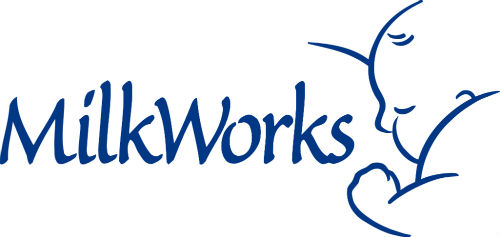Although World Breastfeeding Week is typically celebrated in August, at MilkWorks EVERY day is world breastfeeding week. Since we opened our doors over 16 years ago, exclusive breastfeeding rates in our country have slowly climbed. Many mothers WANT to breastfeed. They START breastfeeding, but many stop far sooner than they want to. Our mission is to help mothers meet THEIR breastfeeding goals.
We often forget that we really do not know much about breastfeeding. Mothers and babies relied upon breastfeeding for centuries, since the beginning of mankind. We disrupted breastfeeding ~sixty years ago. As we try and restore breastfeeding, our values have shifted, our daily life looks different, and there is a huge gap in what we do and don’t know.
We think (know?) that breastfeeding is natural. Too often that translates to breastfeeding being perfect. We may have fairy tale images about breastfeeding in other countries. Surely mothers who ONLY breastfeed have no problems? Certainly ONLY American mothers get cracked nipples or have babies who lose weight?
Fortunately, an evolutionary anthropologist is trying to set us straight.
NPR published a story about breastfeeding in northern Namibia, a country in Africa, where all babies breastfeed. Girls grow up surrounded by breastfeeding. Mothers give birth at home and have long, uninterrupted contact with their babies after birth. This means there must be no problems, right? Wrong. Just like most American women, most Namibia women have problems with latch and milk supply.
Breastfeeding is hard in Namibia, just like it is in the US. The key difference the anthropologist found is that Namibia mothers have mothers (AKA grandmothers) who help them navigate their breastfeeding challenges. Many U.S. mothers do not. American grandmothers may not have breastfed, they may still be employed full time and unable to provide care, or they may live 1,500 miles away.
It has always been a challenge in the breastfeeding support world to know how candid we should be with mothers. Do we tell mothers how wonderful breastfeeding is, and stop there? Or are we candid and say: “Breastfeeding may be hard. You may hurt and you may be frustrated. But you are up to it and we are here to help!”
Our current culture is raising girls to be tough. American girls take hits on the soccer field. They wear hard hats and manage construction sites. They don surgery gowns and master robotic surgery. Who says that American women cannot master breastfeeding?
MilkWorks has a short PSA video in which mothers share that breastfeeding was hard for them and MilkWorks was here to help. This is our mission in a nutshell. However, we know that some people feel we cast breastfeeding in a negative light because we are honest about its challenges.
Women around the world have a lot to teach us as we restore breastfeeding in our country. Thanks to the mothers and babies in Namibia, the reporters from NPR, and an anthropologist who cares, we are learning. Yes, breastfeeding CAN BE, and IS, hard ANYWHERE. Yes, there may be issues, and, yes, mothers need and deserve a grandmother to support them along their path. MilkWorks may not be the real thing. But in 2017, for many mothers, we may be the next best thing when it comes to the nurture and support that new mothers need to make breastfeeding work for them.
